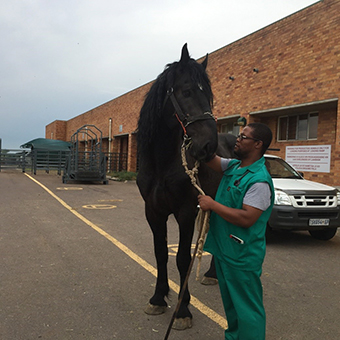
Dr Makae took up his studies at the South Campus
of the UFS, and now serves as a community vet in Tshwane.
Photo: Anja Aucamp
Dr Thapelo Makae’s youthful passion has been a driving force in his chosen career. He says: “Like any veterinarian, my love for animals started from childhood. Growing up, I always asked myself why animals didn’t have doctors like we kids did, when our pets fell ill or died.” While veterinary services were unknown where he was raised in the Phelindaba location in Mangaung, Bloemfontein, Dr Makae started doing his own research as early as Standard 1 (Grade 3). He affirms, “I’ve always wanted to help these creatures that, it seemed, no one could help.”
Having started his academic journey on the South Campus in the CPP (as the University Preparation Programme was then known), Dr Makae obtained an undergraduate degree in Agriculture, later completing an honours degree in Agriculture. “It was at this stage,” he says, “that I was recruited by Prof Johan Greyling and the late Dr Luis Schwalbach. With their support, I completed my MSc Agric, besides having the opportunity to be a junior lecturer in Animal Physiology. Dr Schwalbach was my supervisor, my mentor, and a veterinarian himself, and I worked very closely with him. He encouraged me to pursue my passion and the dream to go ahead and study Veterinary Medicine.”
Realising that dream, Dr Makae is now employed at the Gauteng Department of Agriculture and Rural Development as a community veterinarian. Among his many responsibilities, he is charged with serving the communities of the Tshwane Metro, where he visits farmers, assisting them with health and vaccination plans, and providing advice to help them develop their skills.
Dr Makae also seeks opportunities to pass on his dream. “What I am most passionate about is going to schools and giving talks to schoolchildren, especially those from previously disadvantaged communities, who might not know much about Veterinary Medicine,” he says.